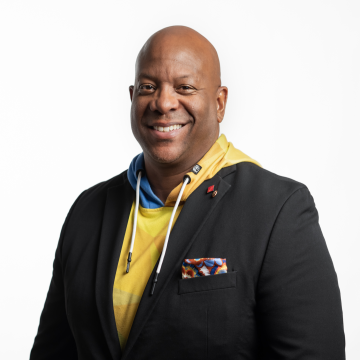James Garrett, Jr.
2025 Bush Fellow

Activist architect | Civic futurist | Urban landscape articulator
As co-founder and managing partner of the nationally recognized architecture firm 4RM+ULA, James Garrett Jr. has spent more than two decades designing spaces that reflect the aspirations of the communities they serve. From repurposing a vandalized car dealership into the new Springboard for the Arts headquarters to leading the design of Juxtaposition Arts’s $12M campus in North Minneapolis, his work has transformed neighborhoods and inspired a new generation of Black, Indigenous and people of color (BIPOC) architects.
Born into a legacy of leadership in Saint Paul’s Rondo community, James was raised to lead with purpose and integrity. His design ethic—rooted in fairness, artistic expression and a belief in “Black excellence on every level”—has made him a force for change in the architecture industry and beyond. He was a groundbreaking leader in bringing a hip-hop perspective to architecture, and his visionary approach to environmental design and community development has brought community engagement in the design process to a new level.
With the Bush Fellowship, James will deepen his exploration of sustainable, climate-responsive materials and methods of building homes, while expanding his reach as a thought leader and activist for inclusive design.
What does leadership mean to you?
My father and grandfather were community leaders, and I was raised to lead from birth. I have an innate sense of fairness, a good eye for talent and an uncanny ability to put people in positions to succeed. From being elected co-chair of the Black Environmental Design Students Association at UC Berkeley to leading professional organizations like the Assembly of Architects and MSP NOMA (National Organization of Minority Architects), I’ve consistently shown that leadership means assembling strong teams, advocating for equity and making space for the next generation to rise.
What change are you trying to create?
I want to focus the next phase of my career on developing climate-responsive, low-cost housing units that don’t depend on subsidies or political will to get built. We’re heading toward a convergence of housing scarcity and climate volatility, and our built environment isn’t ready. I believe it’s possible to radically reduce housing costs while increasing climate resilience through smarter design, material innovation and rethinking construction norms.